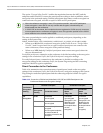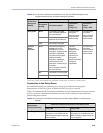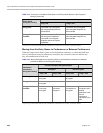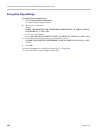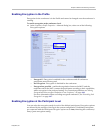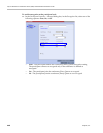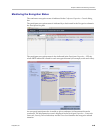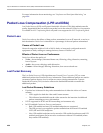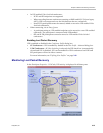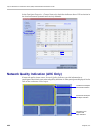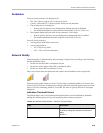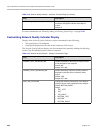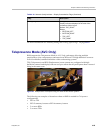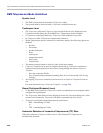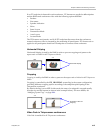
Polycom RealPresence Collaboration Server (RMX) 1500/2000/4000 Administrator’s Guide
4-50 Polycom, Inc.
For more information about monitoring, see "Conference and Participant Monitoring” on
page 13-1.
Packet Loss Compensation (LPR and DBA)
Lost Packet Recovery (LPR) and Dynamic Bandwidth Allocation (DBA) help minimize media
quality degradation that can result from packet loss in the network. Packet loss Compensation
is available in AVC Conferencing Mode only and is not supported in SVC Conferencing Mode.
Packet Loss
Packet Loss refers to the failure of data packets, transmitted over an IP network, to arrive at
their destination. Packet Loss is described as a percentage of the total packets transmitted.
Causes of Packet Loss
Network congestion within a LAN or WAN, faulty or incorrectly configured network
equipment or faulty cabling are among the many causes of Packet Loss.
Effects of Packet Loss on Conferences
Packet Loss affects the quality of:
• Video – frozen images, decreased frame rate, flickering, tiling, distortion, smearing,
loss of lip sync
• Audio – drop-outs, chirping, audio distortion
• Content – frozen images, blurring, distortion, slow screen refresh rate
Lost Packet Recovery
The Lost Packet Recovery (LPR) algorithm uses Forward Error Correction (FEC) to create
additional packets that contain recovery information. These additional packets are used to
reconstruct packets that are lost, for whatever reason, during transmission. Dynamic
Bandwidth Allocation (DBA) is used to allocate the bandwidth needed to transmit the
additional packets.
Lost Packet Recovery Guidelines
• If packet loss is detected in the packet transmissions of either the video or Content
streams:
— LPR is applied to both the video and Content streams.
— DBA allocates bandwidth from the video stream for the insertion of additional
packets containing recovery information.
• LPR is supported in H.323 and SIP networking environments only.
•In LPR-enabled Continuous Presence conferences:
— Both LPR-enabled and non-LPR-enabled endpoints are supported.
— The LPR process is not applied to packet transmissions from non-LPR-enabled
H.323, SIP and H.320 endpoints.
— Non-LPR-enabled endpoints can be moved to LPR-enabled conferences and LPR-
enabled participants can be moved to conferences without LPR-enabled (where
they remain LPR-enabled).



